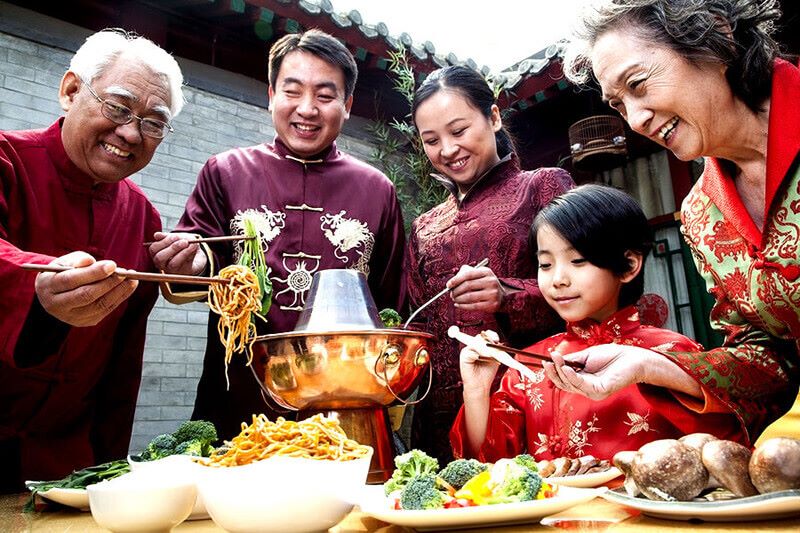From the outside looking in, the Chinese lifestyle may seem intricate, complicated, or simply just unfamiliar. Yet, once you delve into the vibrant fabric of China’s customs, values, and daily routines, you soon realize the unique aspects that make the lifestyle in China so captivating. From traditional values, the importance of community and family, to the balance of Yin and Yang, there’s a lot that contributes to the enchanting allure of Chinese life. Let’s explore the nuances that set the Chinese lifestyle apart.
Traditional Values Still Play a Significant Role in Chinese Lifestyle
China’s society and way of living are deeply influenced by traditional values, many of which stem from Confucian principles. This ancient philosophy remains a significant part of the Chinese lifestyle, even amid the country’s fast-paced modernization. The Confucian doctrine instills values such as filial piety, righteousness, and good moral character. Respect for parents and elders is a deeply ingrained societal norm, reflected in many aspects of daily life. The value placed on education is also notable. In China, academic diligence is not just encouraged, it’s expected. The pursuit of knowledge and intellectual growth is seen as a vital part of personal development. Despite the blend of old and new that characterizes modern China, these traditional values continue to shape the attitudes, behaviors, and lifestyle of Chinese people.
The Importance of Community and Family in Chinese Culture
In China, familial and community bonds are deeply intertwined with everyday living. Families are often very close, with multiple generations sometimes residing under the same roof or in close proximity. Chinese culture places high emphasis on ‘face’, a concept revolving around upholding and gaining respect in social interactions. It’s not unusual for decisions in various spheres of life – such as career choices or personal relationships – to be guided by this principle of maintaining familial and societal honor. The significance of community and family is also underscored during cultural festivities. For instance, the Lunar New Year is a much-anticipated occasion that brings families together for joyous celebrations, reinforcing the importance of these bonds. The Chinese lifestyle, therefore, promotes a sense of collective identity, underpinned by strong familial ties and community participation.
Living a Balanced Life – The Concept of Yin and Yang
In the realm of Chinese philosophy, the principle of Yin and Yang is a central tenet. This timeless concept represents the interplay and balance of opposing yet complementary forces. These may include light and darkness, warmth and coldness, or passivity and activity. The belief is that an equilibrium between these contrasting aspects is key to a well-rounded, healthy life. This notion pervades numerous facets of the Chinese lifestyle. For instance, you can see this balance manifest in Chinese architecture, which strives to harmonize the building with its natural surroundings. The culinary practices in China also reflect this philosophy. A meal is often designed to balance hot and cold, spicy and mild, cooked and raw ingredients. Even in traditional Chinese medicine and physical practices like Tai Chi, the Yin and Yang concept plays an integral role, advocating for a balanced approach to health and wellness. So, in essence, the Yin and Yang philosophy, with its focus on balance and harmony, shapes the Chinese approach to life in multiple, profound ways.
Chinese Fashion – A Blend of Tradition and Modernity
Fashion in China showcases a harmonious blend of the country’s rich heritage and contemporary trends. Western-style outfits are a common sight in everyday wear, signaling the country’s openness to global influences. But this doesn’t mean that traditional Chinese clothing is a thing of the past. On the contrary, traditional attires like the cheongsam, with its form-fitting silhouette, and the hanfu, reminiscent of ancient Chinese fashion, are enjoying a renaissance. These outfits are not just reserved for special occasions but can often be spotted in daily life, exhibiting a revival of cultural pride. Fashion choices here are a testament to China’s ability to marry old and new, honoring the past while embracing the present. Whether it’s a grand festival, an intimate wedding, or just an ordinary day, the interplay of traditional and modern elements is a distinct feature of Chinese fashion, mirroring the unique blend that characterizes the Chinese lifestyle.
Chinese Work Culture – Hard Work and Dedication
Chinese professional life is characterized by its intensity and unwavering commitment to success. Embodying the philosophy of “Chi Ku,” or “eating bitterness,” the working culture in China values the endurance of hardship. This philosophy manifests in the form of long working hours and high performance expectations, which are considered standard. To some outsiders, this robust work ethic may appear overwhelming. However, in Chinese culture, this diligence and resilience are viewed as necessary components on the pathway to both individual and communal triumph. The essence of hard work and dedication in China’s professional landscape reflects the broader Chinese lifestyle’s unique blend of tradition, community, and balance.

